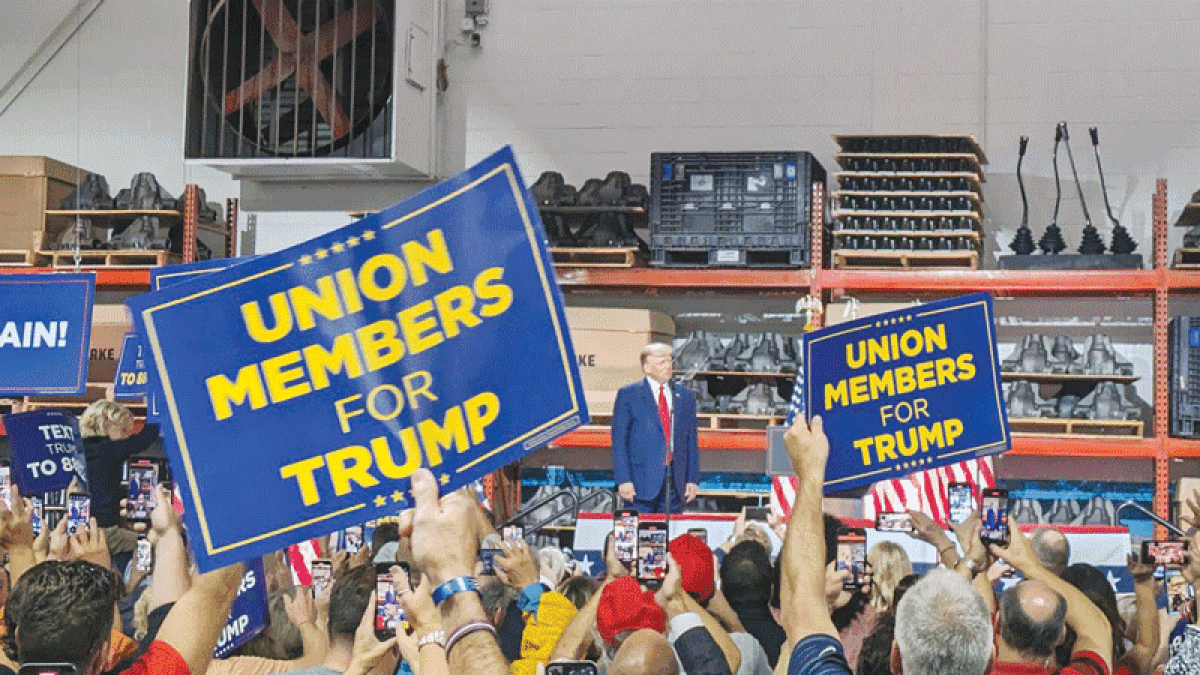By Jonathan Oosting/Bridge Michigan and Dean Vaglia/C & G Newspapers Staff Writer
CLINTON TOWNSHIP — Michigan auto workers deserve “fair wages and greater stability” but their jobs could soon collapse because of a government-backed shift to electric vehicles, former President Donald Trump warned in a speech Sept. 27 in Clinton Township.
“Your current negotiations don’t mean as much as you think” because “in two to three years you will not have one job in this state,” Trump said in the speech at Drake Enterprises, near Gratiot Avenue and Hall Road.
His remarks were aimed at striking members of the United Auto Workers union, who 13 days earlier began walking off jobs at Ford Motor Co., General Motors Co. and Stellantis.
Drake Enterprises is a non-unionized auto supplier that specializes in gear shift levers and transmission components for heavy trucks.
In his return to Macomb County, Trump used his roughly hour-long speech to bash Democratic President Joe Biden’s push for electric vehicles and promised to stop what he called a “transition to hell” that will force automakers to close factories and move production overseas, repeating claims Bridge Michigan previously found to be inflated.
Trump’s visit to the township occurred without incident, according to township clerk Kim Meltzer
“I think our township did a great job coordinating with the safety of the community with the law enforcement and with the schools, because they were butting up to the school property,” Meltzer said, referring to various L’Anse Creuse Public Schools properties near Drake Enterprises. “We were a great host, and I think that’s what we should be no matter who the candidate is.”
Meltzer, who was not in attendance, said she was honored to have presidential candidates visit Clinton Township.
“I’m always honored to have any person who is wanting to serve our country to pick Clinton Township to come into and speak and let everybody know their platform … I think it’s a good thing for Clinton Township to have people of that stature coming into the community. If Biden came in, I would feel the same way.”
Clinton Township Supervisor Robert Cannon, who was also not in attendance, praised the township’s public safety departments and all attendees for being respectful with each other.
Candidates on both sides court autoworkers
With a potential 2024 rematch looming, Biden and Trump are already battling for the blue-collar vote in Michigan, which is the birthplace of the modern labor movement and remains one of the most unionized states in the country.
As of 2022, 14% of Michigan workers — about 589,000 — were members of a union, the 11th highest rate in the country and well above the national average of 10%, according to federal data from the U.S. Bureau of Labor Statistics.
While striking UAW members are pushing for higher wages, cost-of-living increases and changes to a lower-tiered pay system for new hires, the union has also expressed concern about the industry’s ongoing industry shift to electric vehicles, which have fewer parts and therefore require fewer workers to produce, an anxiety Trump has hammered on again and again.
In his speech in Clinton Township, Trump laid out what he called a “vision for economic nationalism” focused on keeping American jobs at home.
The visit came the day after Biden made history as the first sitting president to join a picket line. Biden spoke to striking UAW members on Sept. 26 outside a General Motors facility in Belleville, where he backed the union’s call for a 40% wage bump, saying auto workers deserve a “hell of a lot more” than they are currently paid.
The Biden administration’s proposed fuel emissions standards, which are projected to require two-thirds of all new auto sales to be electric by 2032, amounts to a “government assassination of your jobs and your industry,” Trump argued.
“He’s selling you out to environmental extremists, the radical left, people who have no idea how bad this is going to be,” Trump said. “You can be loyal to American labor or you can be loyal to the environmental lunatics, but you can’t really be loyal to both.”
Biden has called for a “just” transition to EVs as part of his goal to make half of all new car sales electric by 2030. That would be a dramatic increase in the U.S., where EVs accounted for about six percent of new car sales in 2022, which doubled the prior year.
To accelerate the shift, Biden has authorized billions of dollars in federal grants and loans to help traditional automakers retool existing facilities for EV production. Last year’s Inflation Reduction Act also expanded federal tax credits for EV customers.
Detroit automakers are already spending big to ramp up EV production and compete with other companies, most notably Tesla, the California-based company that uses cheaper nonunion labor to produce electric cars.
General Motors, which plans to spend $7 billion on EV and battery facilities in Michigan, has aims to end production of internal combustion engines by 2035.
Trump aggressively courted blue-collar workers in his winning 2016 campaign, attacking what he called unfair international trade deals like the North American Free Trade Agreement, which he eventually scrapped and replaced as president.
Trump won Michigan that year by a razor-thin 10,714 votes, topping Democratic nominee Hillary Clinton by fewer than three-tenths of a percentage point. Biden won the state by about three percentage points in 2020, topping Trump by 154,188 votes.
St. Clair Shores City Councilman and UAW 412 member Chris Vitale attended the event, describing it to be as “crowded,” “raucous,” and “boisterous” as any other of the Trump events he’s attended. But for as brash as some of the former president’s comments may have been, Vitale said there was some truth to them.
“Trump says something like ‘Electric cars are going to spell the death of your industry,’” Vitale said. “Well, it might not spell the absolute death of things — I think that three years from now there will still be three major auto companies with a presence in the Detroit area. But I will say that potentially five to 10 years out, maybe we’re down to a smaller number (and) a smaller number of facilities, and eventually it will dwindle and dry up. He may be a little exaggerated in his timeline, but he isn’t necessarily wrong.”
Vitale recounted that much of the crowd were fellow union members and that being there was a show of support from Republican-aligned UAW members, who had to stand around for three hours in Drake Enterprises’ facility in order to attend the speech.
“The idea that the union people are not supportive of Trump is false,” Vitale said. “He has a lot of supporters in the union ranks. He would not win Macomb County if he didn’t.”
Vitale says he heard members present say they wished the speech was held in a union shop, but he believes it would not have been favorable for a union shop’s owner to do so.
“Union shops are typically much larger,” Vitale said. “They often sell to consumers and they have stockholders and they risk being boycotted and things like that, whereas nonunion shops are typically family-owned. One guy calls the shots and he gets to decide if Trump comes in there or not. They don’t sell to retail, so they don’t have to worry about being boycotted.”
Ahead of Trump’s remarks, U.S. Sen. Debbie Stabenow, D-Michigan, released a statement addressing the Trump and Biden visits and a “major contrast” in presidential leadership.
She called Biden “a true champion for our workers and the industry that fuels Michigan’s economy.”
“He’s committed to a future where our workers get the pay and benefits that they deserve, instead of their jobs being shipped overseas or to the South,” Stabenow said.
In contrast, she said Trump “turned his back on our autoworkers.”
“He’s lined the pockets of the wealthy and shipped American manufacturing jobs overseas. When times were tough, he said that auto plants should move to lower-cost, nonunion states. He even said the auto companies should just go bankrupt,” Stabenow said. “This week, more than ever, it’s clear who stands with Michigan.”
 Publication select ▼
Publication select ▼



















